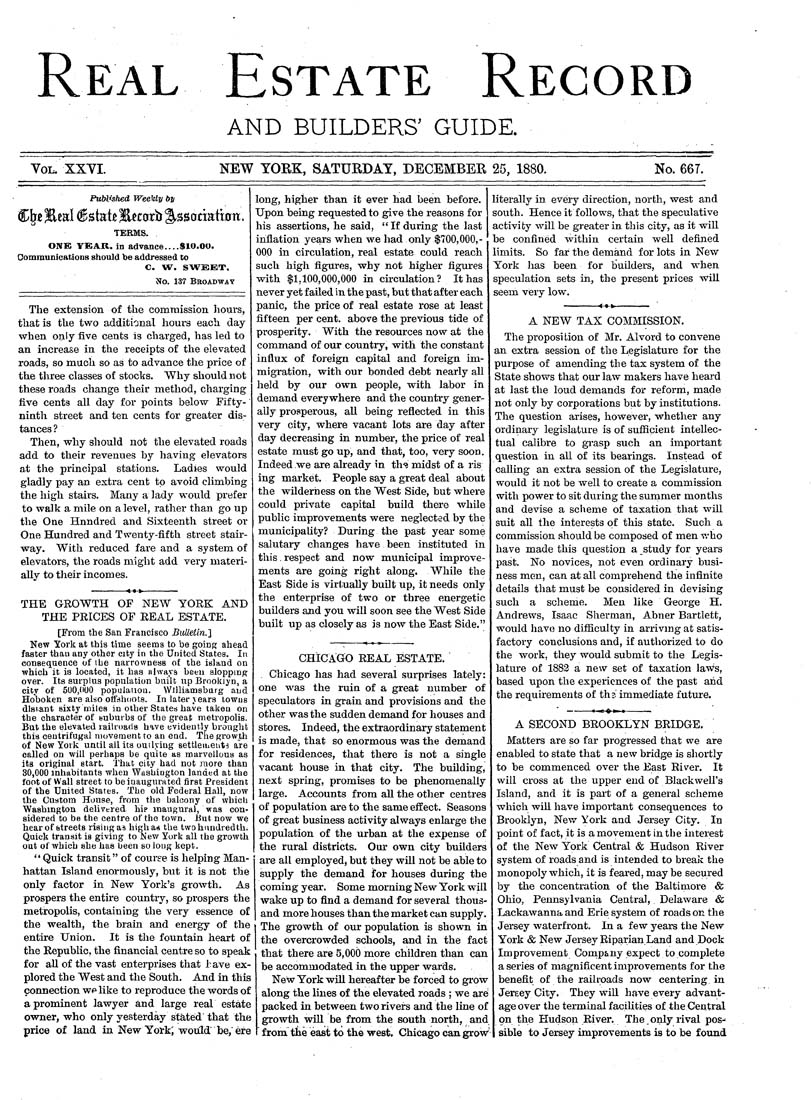Columbia University Libraries Digital Collections: The Real Estate Record
Use your browser's Print function to print these pages.
Real estate record and builders' guide: v. 26, no. 667: December 25, 1880

Text version:
Please note: this text may be incomplete. For more information about this OCR, view About OCR text.
Real Estate Record AND BUILDERS' GUIDE. Vol. XXVI. NEW YOEK, SATURDAY, DECEMBER 25, 1880. No. 667. Pubb'shed Weekly by TERMS. ONE YEAR, in advance....SIO.OO. Communications should be addressed to C. W. S^VEET, No. 137 Broadway The extension of the commission ]iours, that is the two additional hours each day when only five cents is charged, has led to an increase in the receipts of the elevated roads, so much so as to advance the price of the three classes of stocks. Why should not these roads change their method, charging five cents all day for points below Fifty- ninth street and ten cents for greater dis¬ tances? Then, why should not the elevated roads add to their revenues by having elevators at the principal stations. Ladies would gladly j)ay an extra cent tp avoid climbing the high stairs. Many a lady would prefer to walk a mile on a level, rather than go up the One Hundred and Sixteenth street or One Hundred and Twenty-fifth street stair¬ way. With reduced fare and a system of elevators, the roads might add very materi¬ ally to their incomes. THE GROWTH OF NEW YORK AND THE PRICES OF REAL ESTATE. [From the San Francisco Bidleiin.'] New York at this time seems to be going ahead faster thau any otlier city in the United States. In consequence of the narrowness of the island on which it is located, it has always been sloppmg over. Its surplus population built up Brooklyn, a city of 500,(100 population. Williamsburg aud Hoboken are also offshoots. In later jears towns distant sixty miles in other States have taken on the character of suburbs of the great metropolis. But the elevated railroads have evidently brought this centrifugal movement to an end. The growlh of NewYork until all its oui lying settleuienti are called on will perhaps be quite as marvellous as its original start. That city had not jnore than 30,000 inhabitants when Washington landed at the foot of Wall street to be inaugurated first President of the United States. The old Federal Hall, now the Custom House, from the balcony of which Washington delivered hi? inaugural, was con¬ sidered to be the centre of the town. But now we hear of streets rising as high as the two hundredth. Quick transit is giving to New York all the growth out of which she has been so long kept. " Quick transit" of course is helping Man¬ hattan Island enormously, but it is not the only factor in New York's growth. As prospers the entire country, so prospers the metropolis, containing the very essence of the wealth, the brain and energy of the entire Union. It is the fountain heart of the Republic, the financial centre so to speak for all of the vast enterprises that bave ex¬ plored the West and the South. And in this connection we like to reproduce the words of a prominent lawyer and large real estate owner, who only yesterday stated that the price of land in NewYork', would' be,'ere long, higher than it ever had been before. Upon being requested to give the reasons for his assertions, he said, " If during the last inflation years when we had only $700,000,- 000 in circulation, real estate could reach such high figures, why not higher figures with $1,100,000,000 in circulation? It has never yet failed in the past, but that after each panic, the price of real estate rose at least fifteen per cent, above the previous tide of prosperity. With the resources now at the command of our country, with the constant influx of foreign capital and foreign im¬ migration, with our bonded debt nearly all held by our own people, with labor in demand everywhere and the country gener¬ ally prosperous, all being reflected in this very city, where vacant lots are day after day decreasing in number, the price of real estate must go up, and that, too, very soon. Indeed we are already in th